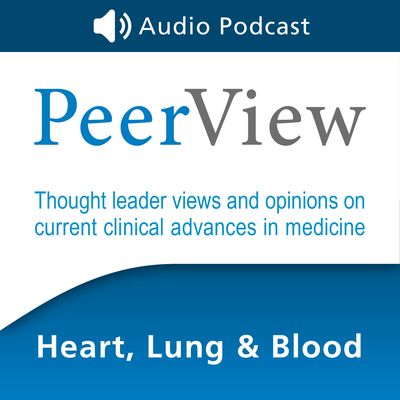PeerView (PVI) is a leading provider of high-quality, innovative continuing education (CME/CE/CPE and MOC) for clinicians and their interprofessional teams. Combining evidence-based medicine and instructional expertise, PeerView activities improve the knowledge, skills, and strategies that support clinical performance and patient outcomes. PeerView makes its educational programming and expert-led presentations and symposia available through its network of popular podcast channels to support specific specialties and conditions. Each episode includes a link to request CME/CE credit for participation. PeerView is solely responsible for the selection of topics, the preparation of editorial content, and the distribution of all materials it publishes.
http://ww2.peerview.com
Neal K. Lakdawala, MD - Making New Strides in Hypertrophic Cardiomyopathy: The Latest Guidelines, Science, and Strategies for Early Diagnosis and Tailored Treatment
Go online to PeerView.com/TCX860 to view the activity, download slides and practice aids, and complete the post-test to earn credit. Hypertrophic cardiomyopathy (HCM) is a clinically complex disease that is often undiagnosed or misdiagnosed. The mechanisms behind its pathophysiology are not yet fully understood, but HCM has multiple underlying drivers, including cardiac muscle hypercontractility. It is the most common genetic heart disease and follows an autosomal dominant pattern with a poorly defined prevalence, age-dependent penetrance, and widely variable outcomes, as no medications are specifically indicated for its treatment. Encouragingly, recent advances in precision medicine and emerging treatment strategies, such as targeted therapy with small molecules, have demonstrated improvements in imaging parameters and quality of life. In this engaging activity, based on a recent live web broadcast, leading experts examine the pathophysiology of HCM, current guideline recommendations, and patient-centered care, as they explore the latest evidence for myosin inhibitors. Compelling videos of patients with HCM are shown to articulate first-person perspectives on how this condition affects individuals and their families. Upon completion of this activity, participants should be better able to: Differentially diagnose patients suspected of having HCM consistent with current guidance and recent advances in testing and technology to promote early recognition, Recognize the burdens that patients with HCM experience and the effects that diagnosis and treatments can have on their lifestyle, activity level, and emotional well-being, Select from among current and emerging therapeutic strategies based on their efficacy, safety, and ability to address the underlying pathophysiology of HCM, Collaborate with multidisciplinary and interprofessional care colleagues to personalize HCM management plans consistent with new recommendations, including imaging and genetic testing, medical therapies, sudden cardiac death risk assessment and prevention, and lifestyle considerations, such as referring patients to HCM centers.
